Key takeaways:
- Catchy hooks are essential for creating emotional connections and establishing a song’s identity, drawing listeners in with memorable phrases and melodies.
- Effective hook writing techniques include starting with a question, using vivid imagery, and leveraging repetition to enhance emotional resonance and memorability.
- Collaboration and personal experiences can significantly enhance the hook writing process, allowing for innovative ideas and deeper connections with listeners.
- When submitting hooks, clarity, audience awareness, and timeliness are crucial for ensuring that the message resonates and captures attention.
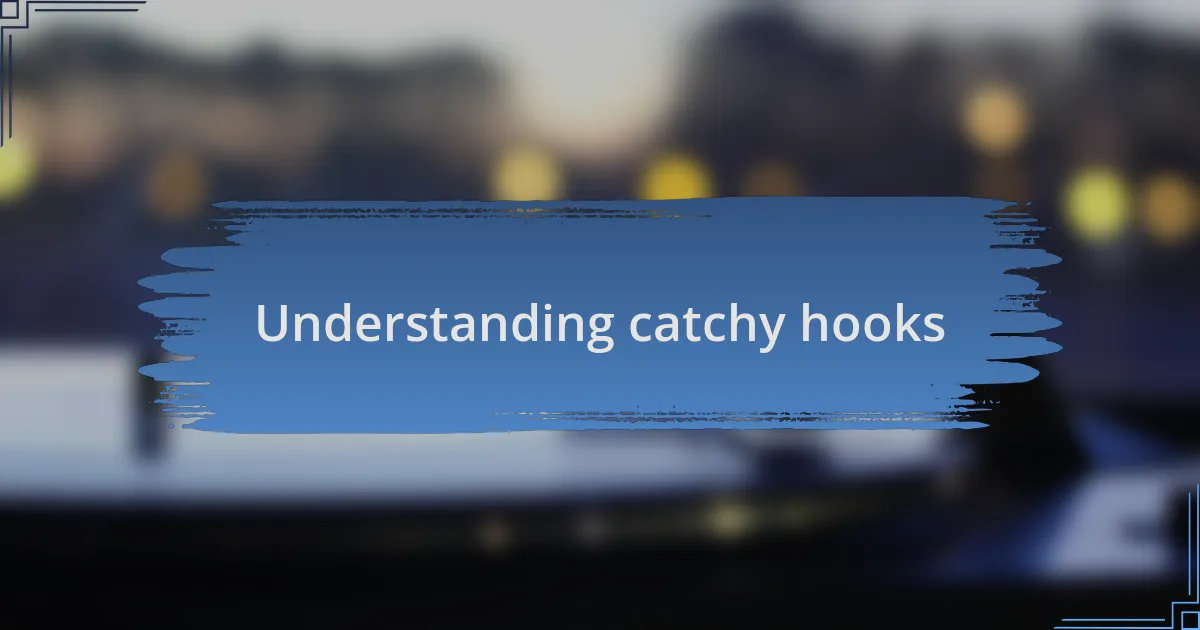
Understanding catchy hooks
Catchy hooks are essential components of a song that draw the listener in, creating an immediate emotional connection. I remember the first time a melody popped into my head and wouldn’t let go; it was the hook that sparked countless ideas for lyrics and themes. It’s fascinating how a simple phrase or catchy melody can linger long after the song has ended, isn’t it?
When I think of successful hooks, I often reflect on how they encapsulate the song’s essence in just a few notes or words. A well-crafted hook can bridge the gap between the listener’s experiences and the songwriter’s intent. Have you ever found yourself humming a tune you just couldn’t shake off? That’s the power of a hook; it stays with you, reflecting shared emotions and experiences.
Crafting a catchy hook involves more than just catchy lyrics; it’s about striking a balance between originality and familiarity. In my experience, some of the most memorable hooks incorporate easy-to-remember melodies, playful rhythms, or poignant phrases. The challenge lies in creating something that feels fresh yet resonates deeply—an exhilarating task that, when done right, can elevate a song from good to unforgettable.
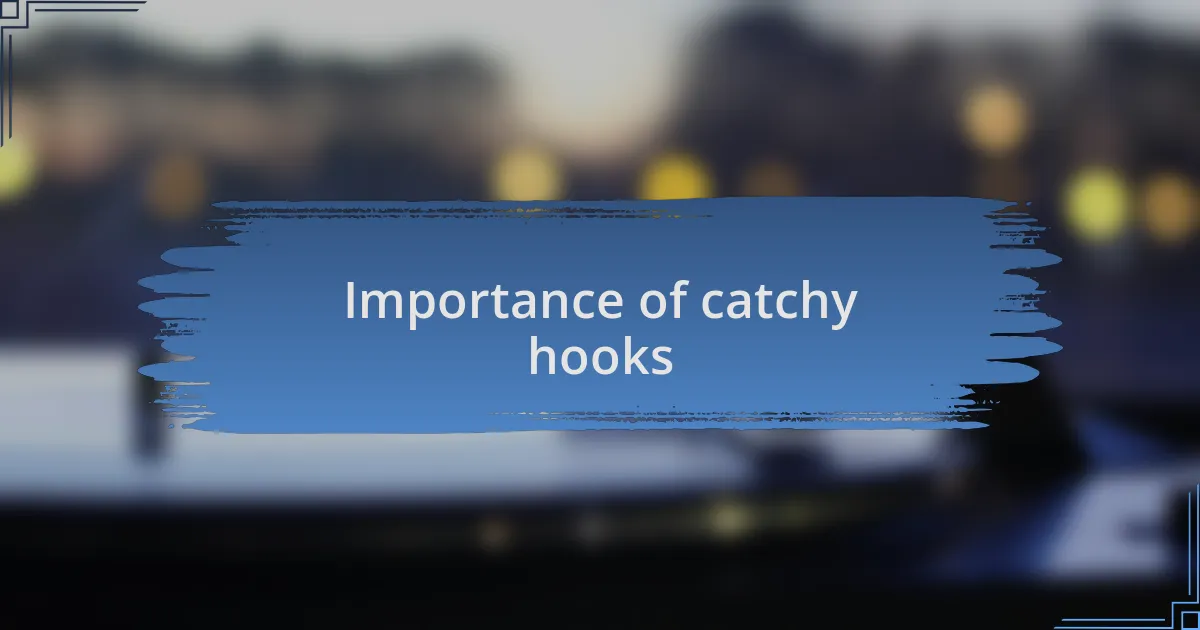
Importance of catchy hooks
Catchy hooks are crucial because they establish a song’s identity right from the get-go. I recall hearing a particular song for the first time; its hook hit me like a lightning bolt, instantly captivating my attention. That moment made me realize how vital it is for listeners to have something memorable to latch onto, creating a connection that can lead to repeated listens.
The beauty of a hook lies in its ability to evoke emotions. I remember writing my own songs and testing different hooks on friends—watching their faces light up was a rewarding experience. Have you noticed how certain melodies can transport you back to a specific moment in your life? That’s the magic of a catchy hook; it not only entertains but also resonates on a deeper level.
When a hook is done right, it becomes the heartbeat of the song, making it unforgettable. I often find myself humming those invigorating tunes during my day-to-day activities, feeling uplifted and inspired. Isn’t it fascinating how a few catchy notes or words can evoke joy, nostalgia, or even empowerment? That’s the power of a hook; it’s not just an artistic element, but a vital force that enhances the listener’s experience and keeps them coming back for more.
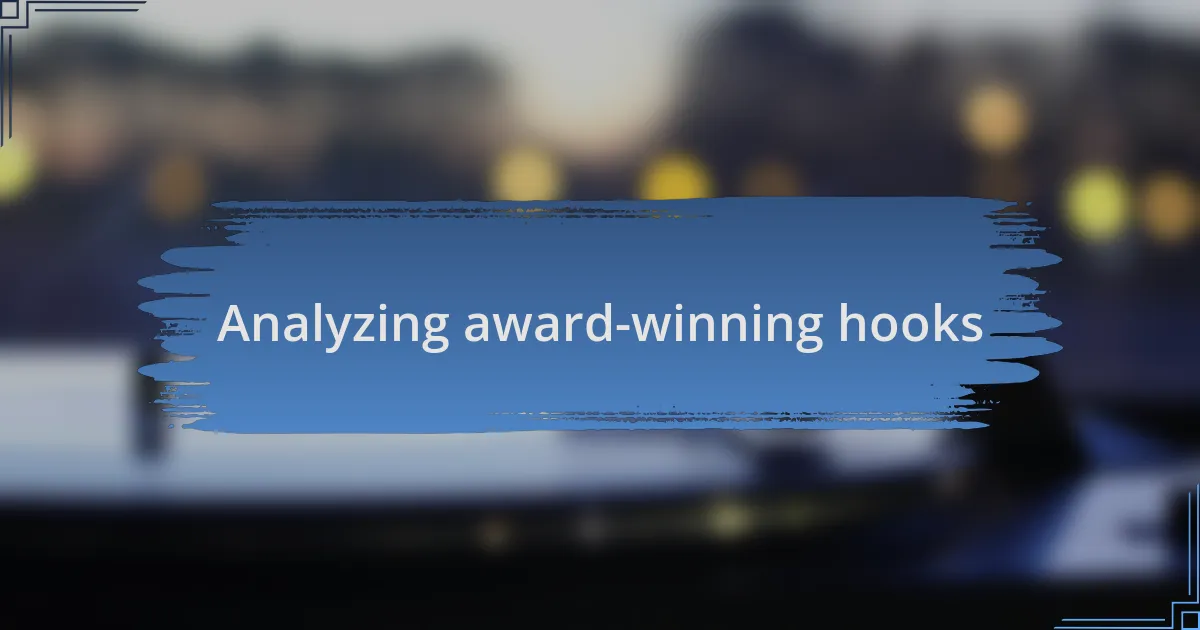
Analyzing award-winning hooks
Analyzing award-winning hooks often reveals a pattern of emotional resonance and clever wordplay. When I dissected the hooks of Grammy-winning songs, I noticed they often use simple yet powerful phrases that evoke strong feelings. For instance, I remember diving into the lyrics of a popular ballad that encapsulated heartbreak in just a few lines—how could something so concise express such profound loss?
One notable example that sticks with me is a hook that plays on contrasting emotions. It effortlessly shifts from joy to sorrow, which I found captivating. When I listened closely, I realized it made me reflect on my own life experiences, connecting me to the artist in a unique way. Can you think of a hook that made you feel a whirlwind of emotions? Those moments really highlight the artistry behind writing effective hooks.
Furthermore, many award-winning hooks employ rhythmic patterns that are easy to sing along to, creating an instant connection. The first time I heard a particular chart-topping hit, I instinctively joined in on the chorus without even realizing it. That spontaneous participation is what makes a hook not just memorable but also a shared experience that unites listeners. Isn’t that the ultimate goal for songwriters?
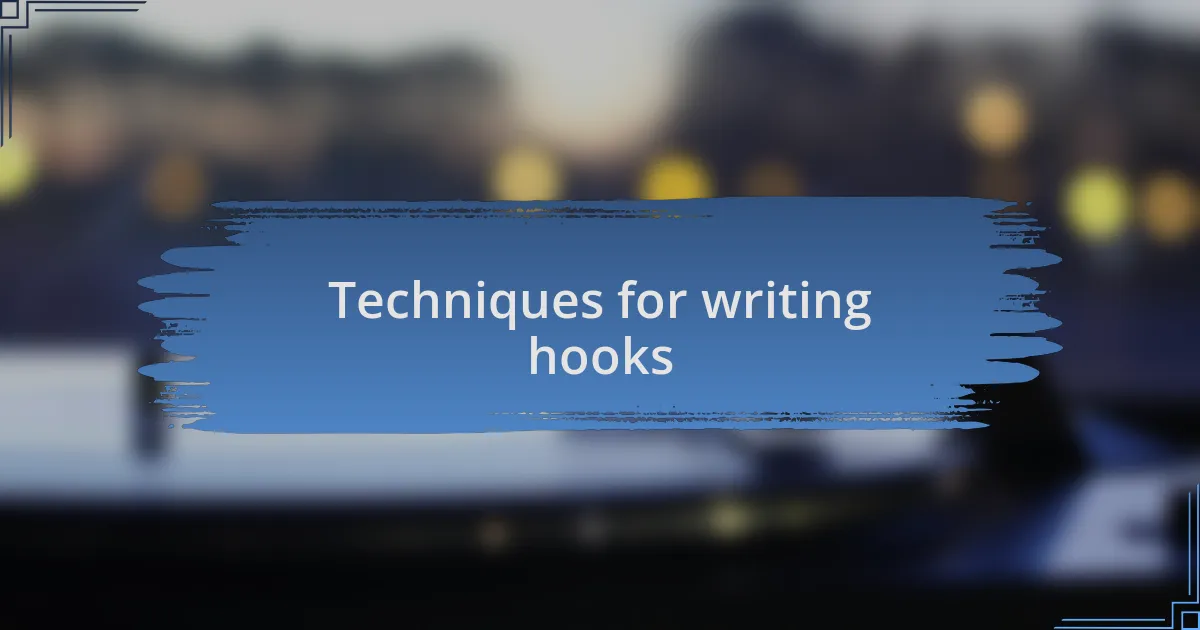
Techniques for writing hooks
One effective technique I often adopt is starting with a question. This can intrigue listeners right from the get-go. For instance, I once crafted a hook that asked, “What would you do if love slipped away?” It grabbed attention immediately, prompting listeners to reflect on their own experiences with love. Isn’t it fascinating how posing a question can open a door to deeper emotional connection?
Another approach I find impactful is using vivid imagery. Descriptive language can transport listeners to a specific moment or feeling. I remember writing a hook that described a rain-soaked street at midnight, capturing both solitude and longing. Those images stayed with people long after the song ended, illustrating just how powerful a strong visual element can be in a hook. Have you ever been drawn into a song because of the imagery painted through its lyrics?
Lastly, leveraging repetition can create a memorable rhythm that resonates. In my own songwriting journey, I’ve experimented with repeating key phrases to emphasize a central theme. I once repeated the line, “Hold on,” throughout a chorus, which not only created a catchy melody but also conveyed a message of perseverance. I believe this technique not only sticks in the mind but also invites listeners to internalize the emotions behind the words. How have you seen repetition work its magic in your favorite songs?
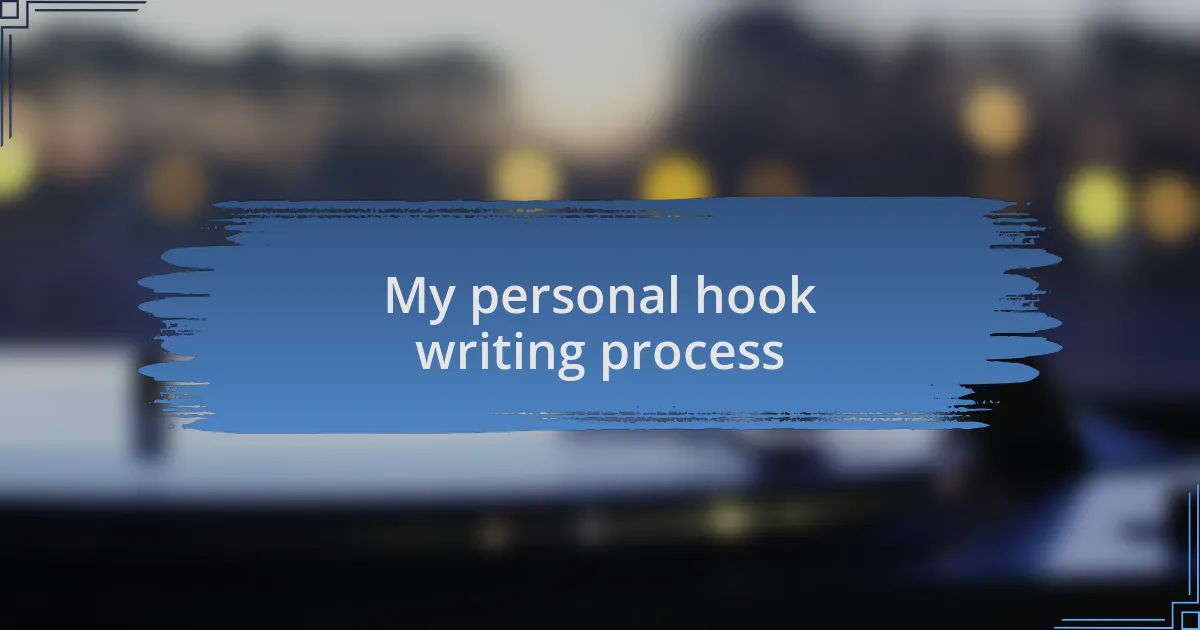
My personal hook writing process
When I sit down to write a hook, my first step is often to tap into a personal experience or emotion. For example, I once drew from a heartbreak that left me feeling utterly lost. That vulnerability allowed me to craft a hook that articulated that sense of longing in a way that resonated deeply with listeners. Have you ever felt a rush of emotion just by hearing a few simple lines?
Next, I like to play with rhythm and sound. I’ll often hum a melody while jotting down words that feel good to say aloud. I recall a moment when I was inspired by the cadence of waves crashing on the shore, leading me to create a hook that mirrored that ebb and flow. Isn’t it interesting how physical sensations can inspire a lyrical rhythm that captures an emotion?
Lastly, I find that collaboration can breathe new life into my hook writing process. Working with another songwriter can lead to unexpected ideas. I remember co-writing a song where my partner suggested a playful twist on a common phrase, transforming it into a catchy hook. That shared creativity taught me how collaboration can spark innovation in ways I wouldn’t have imagined alone. Have you had an experience where teamwork brought out the best in your artistry?
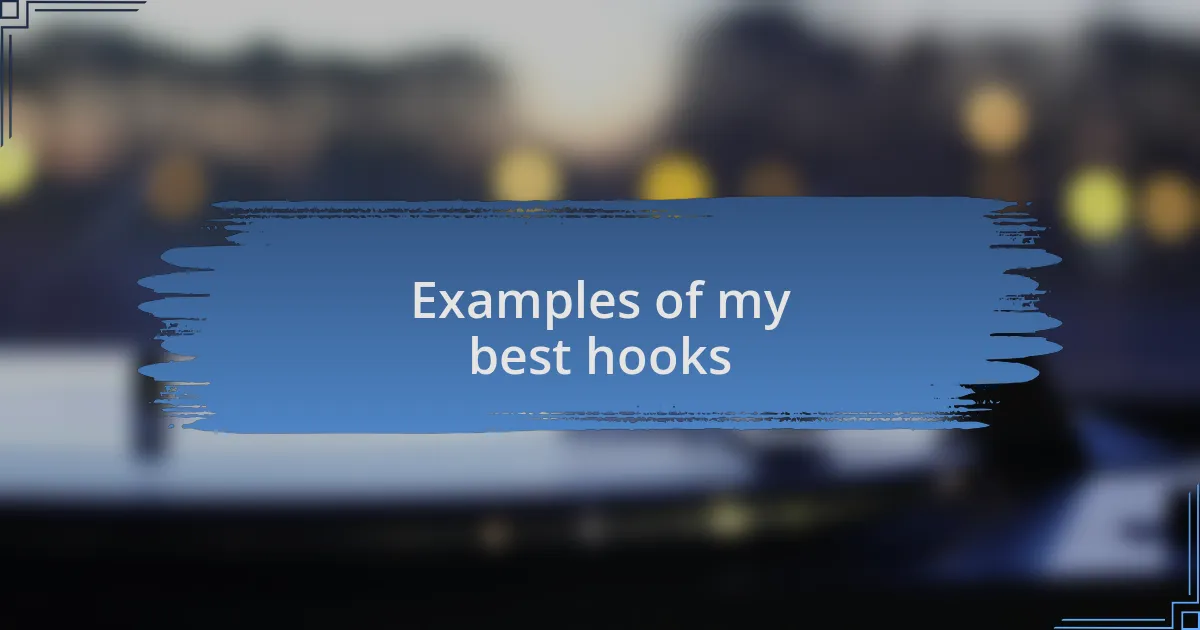
Examples of my best hooks
One of my favorite hooks emerged from a late-night jam session. We were trying to capture that fleeting feeling of joy that comes when you realize you truly belong. I started with, “In the glow of stars, where we found our song,” and that simplicity evoked a sense of belonging that resonates with so many. Have you ever had those moments where the right words just flow effortlessly?
Another memorable hook came to me during a walk in the rain. The rhythmic patter on the pavement sparked the thought, “Dancing through puddles, defying the storm.” It paints a vivid picture, doesn’t it? It’s a reminder that even in tough times, joy can be found in the simplest of actions. How often do we let life’s little moments inspire us in unexpected ways?
A more playful approach led to a hook that has become a crowd favorite. While brainstorming with friends, someone jokingly said, “Life’s a pizza—sometimes a little cheesy.” That struck me! I crafted it into, “You can’t slice it up, you gotta eat it whole,” which perfectly combines humor with a relatable life lesson. Isn’t it fascinating how a spark of fun can lead to something memorable?
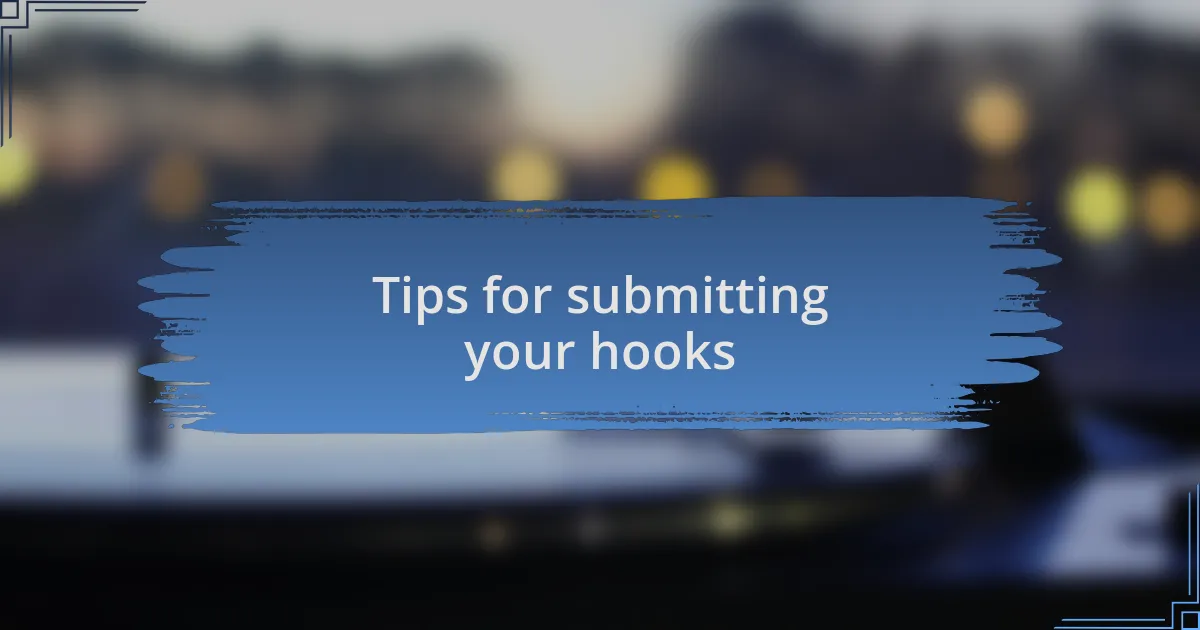
Tips for submitting your hooks
When it comes to submitting your hooks, clarity is key. I once submitted a hook that I thought was clever, but it left the judges scratching their heads. I learned that while creativity is important, ensuring your hook communicates its essence clearly can make a huge difference. Have you ever wondered how many great ideas get overlooked simply because they were too convoluted?
Another tip is to keep your audience in mind. When I wrote a hook aimed at a younger demographic, I used slang and references that resonated with them. It felt satisfying to know I could connect with listeners on their turf. Think about who you want to reach—what emotions or experiences do they relate to? Tailoring your hooks to speak directly to your audience can elevate their impact.
Lastly, timing can be everything. I remember submitting a hook inspired by a current event, and it garnered much attention simply because it was relevant. Staying attuned to the world around you can spark ideas that are timely and relatable. When was the last time you noticed a trend or an event that could inspire your next big hit? Embracing the moment can bring your songwriting to new heights.